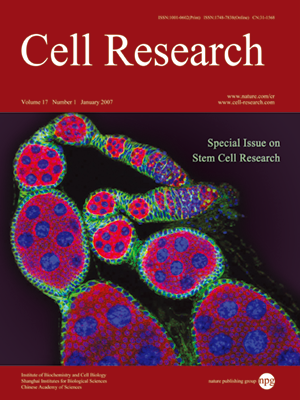
Volume 17, No 1, Jan 2007
ISSN: 1001-0602
EISSN: 1748-7838 2018
impact factor 17.848*
(Clarivate Analytics, 2019)
Volume 17 Issue 1, January 2007: 62-72
ORIGINAL ARTICLES
Promoting human embryonic stem cell renewal or differentiation by modulating Wnt signal and culture conditions
Liuhong Cai1,2,*, Zhaohui Ye1,3,*, Betty Ying Zhou1, 5, Prashant Mali1,4, Canquan Zhou2, Linzhao Cheng1,3
1The Institute for Cell Engineering, Department of Gynecology & Obstetrics, the Johns Hopkins University School of Medicine, Baltimore,
MD 21205, USA; 2Reproductive Medicine Center, The 1st Affiliated Hospital of Zhongshan University, Guangzhou 510089,
China; 3Graduate Immunology program, the Johns Hopkins University School of Medicine, Baltimore, MD 21205, USA, 4Graduate
Program of Biomedical Engineering, the Johns Hopkins University School of Medicine, Baltimore, MD 21205, USA
Correspondence: Linzhao Cheng(lcheng@welch.jhu.edu)
We previously showed that Wnt3a could stimulate human embryonic stem (hES) cell proliferation and affect cell fate determination. In the absence of feeder cell杁erived factors, hES cells cultured under a feeder-free condition survived and proliferated poorly. Adding recombinant Wnt3a in the absence of feeder cell derived-factors stimulated hES cell proliferation but also differentiation. In the present study, we further extended our analysis to other Wnt ligands such as Wnt1 and Wnt5a. While Wnt1 displayed a similar effect on hES cells as Wnt3a, Wnt5a had little effect in this system. Wnt3a and Wnt1 enhanced proliferation of undifferentiated hES cells when feeder-derived self-renewal factors and bFGF are also present. To explore the possibility to promote the proliferation of undifferentiated hES cells by activating the Wnt signaling, we overexpressed Wnt3a or Wnt1 gene in immortalized human adult fibroblast (HAFi) cells that are superior in supporting long-term growth of undifferentiated hES cells than primary mouse embryonic fibroblasts. HAFi cells with or without a Wnt transgene can be propagated indefinitely. Over-expression of the Wnt3a gene significantly enhanced the ability of HAFi feeder cells to support the undifferentiated growth of 3 different hES cell lines we tested. Co-expression of three commonly-used drug selection genes in Wnt3a-overpressing HAFi cells further enabled us to select rare hES clones after stable transfection or transduction. These immortalized engineered feeder cells (W3R) that co-express growth-promoting genes such as Wnt3a and three drug selection genes should empower us to efficiently make genetic modified hES cell lines for basic and translational research.
Cell Research advance online publication 9 January 2007; doi: 10.1038/sj.cr.7310138
FULL TEXT | PDF
Browse 1960


